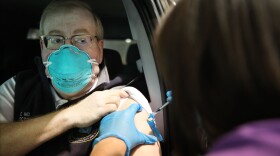While the arrival of COVID-19 vaccines in Oklahoma is being universally celebrated by public health officials, health care workers and medical leaders, they are stressing that the immunizations won't have immediate impact on infection levels and vigilance is still necessary to prevent unnecessary transmission of the virus.
"It is here to stay, regardless of our vaccination process," said Dr. Jennifer Clark of the OSU Center for Health Sciences' Project ECHO faculty team. "Masking is going to be with us for probably the next year to two years until we get appropriately immunized."
"We are going to be doing all of this stuff for the foreseeable future. We're talking months and years, not weeks," Clark said.
"The arrival of the vaccine is definitely something to celebrate, and we are at the Tulsa Health Department very excited to begin administering those doses, it's very important to remember these doses are extremely limited and they are not offering the benefit of protection to Tulsa County residents at-large," said Leanne Stephens, THD's marketing and communications director.
"Just because the vaccine is here, vaccine is not in everyone's arms," said THD Director Bruce Dart. "Until vaccine is in everyone's arms and we've got hopefully 70% population immunity in Tulsa County, we have to continue masking, distancing and paying close attention to hand-washing."
Vice President Mike Pence's White House coronavirus task force said in a Dec. 6 report for Oklahoma that the Sooner State has worse infection trends than other "Heartland" states, and major positive effects from the vaccines are still months off.
"The current vaccine implementation will not substantially reduce viral spread, hospitalizations, or fatalities until the 100 million Americans with comorbidities can be fully immunized, which will take until the late spring," the report reads. "Behavioral change and aggressive mitigation policies are the only widespread prevention tools that we have to address this winter surge."






